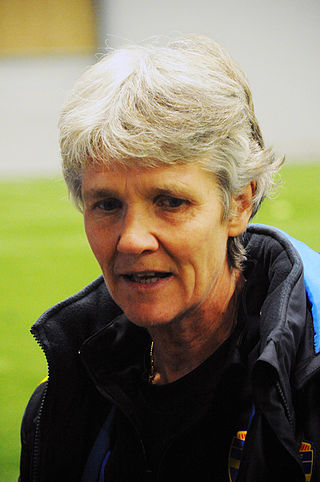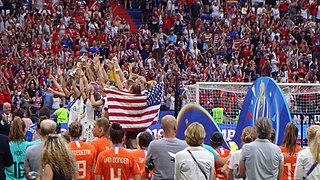
The FIFA Women's World Cup is an international association football competition contested by the senior women's national teams of the members of Fédération Internationale de Football Association (FIFA), the sport's international governing body. The competition has been held every four years and one year after the men's FIFA World Cup since 1991, when the inaugural tournament, then called the FIFA Women's World Championship, was held in China. Under the tournament's current format, national teams vie for the remaining 31 slots in a three-year qualification phase. The host nation's team is automatically entered as the first slot. The tournament, called the World Cup Finals, is contested at venues within the host nation(s) over about one month.

Birgit Prinz is a German former footballer, two-time FIFA Women's World Cup champion and three-time FIFA World Player of the Year. In addition to the German national team, Prinz played for 1. FFC Frankfurt in the Frauen-Bundesliga as well as the Carolina Courage in the Women's United Soccer Association (WUSA), the first professional women's league in the United States. Prinz remains one of the game's most prolific strikers and is the second FIFA Women's World Cup all-time leading scorer with 14 goals. In 2011, she announced the end of her active career. She currently works as a sport psychologist for the men's and women's teams of Bundesliga club TSG 1899 Hoffenheim.

The United States women's national soccer team (USWNT) represents the United States of America in international women's soccer. The team is governed by United States Soccer Federation and competes in CONCACAF.

The Germany women's national football team represents Germany in international women's football. The team is governed by the German Football Association (DFB).

Pia Mariane Sundhage is a Swedish football manager and former professional player. Currently, she is coaching Switzerland. As a player, Sundhage played most of her career as a forward and retired as the top scorer for the Sweden national team.

The Japan women's national football team, commonly known as Nadeshiko Japan (なでしこジャパン), represents Japan in women's association football and is run by the Japan Football Association (JFA). The only country to win every FIFA competition and the most successful women's national team in the Asian Football Confederation, its highest ranking in the FIFA Women's World Rankings is 3rd, achieved in December 2011.

Nadine Marejke Angerer is a German football coach and player who is the former goalkeeping player-coach for Portland Thorns of the National Women's Soccer League (NWSL).
The following are the football (soccer) events of the year 2003 throughout the world.

Joachim "Jogi" Löw is a German football coach and former player. He was the manager of the Germany national team from 2006 until 2021. During his tenure as manager, he led Germany to victory at the 2014 FIFA World Cup in Brazil and the 2017 FIFA Confederations Cup in Russia. In March 2021, Löw announced that he would resign from his position after the delayed Euro 2020. Of all head coaches of the Germany national football team, Löw has managed and won the most matches (189/120).

The Russia women's national football team represents Russia in international women's football. The team is controlled by the Russian Football Union and affiliated with UEFA. Yuri Krasnozhan replaced Elena Fomina as coach of the team in December 2020.

The South Africa women's national football team, nicknamed Banyana Banyana, is the national team of South Africa and is controlled by the South African Football Association.

Homare Sawa is a Japanese former professional footballer who played as a forward or a midfielder. Regarded by many as one of the greatest female footballers of all time and the greatest Asian female footballer of all time, Sawa had a professional club career spanning 24 seasons, mostly with Nippon TV Beleza and INAC Kobe Leonessa. She also spent 22 years with the Japan national team, most notably captaining them to a FIFA Women's World Cup win in 2011 and an Olympic silver medal finish in 2012.

The United States U-20 women's national soccer team is a youth soccer team operated under the auspices of U.S. Soccer. Its primary role is the development of players in preparation for the senior women's national team. The team most recently appeared in the 2024 FIFA U-20 Women's World Cup in Colombia, where they placed third. The team competes in a variety of competitions, including the biennial FIFA U-20 Women's World Cup, which is the top competition for this age group.

Jane Törnqvist is a former footballer who most recently played for Kopparbergs/Göteborg FC. A tough tackling central defender, she wore number 3 for her club. She played 109 games for the Sweden women's national team before retiring from international football in 2005. She also served as the Strength and Conditioning coach of India women's football team for the 2022 AFC Women's Asian Cup.
At the end of each FIFA Women's World Cup final tournament, several awards are presented to the players and teams which have distinguished themselves in various aspects of the game.

The 2019 FIFA Women's World Cup final was an association football match which determined the winner of the 2019 FIFA Women's World Cup. It was the eighth final of the FIFA Women's World Cup, a quadrennial tournament contested by the women's national teams of the member associations of FIFA. The match was played on 7 July 2019 at the Parc Olympique Lyonnais in Décines-Charpieu, a suburb of Lyon, France.

The United States women's national soccer team is the most successful women's national team in the history of the Women's World Cup, having won four titles, earning second-place once and third-place finishes three times. The United States is one of five countries including Germany, Japan, Norway, and Spain to win a FIFA Women's World Cup.. The United States was also the only team that played the maximum number of matches possible in every tournament until they got eliminated in the round of 16 in 2023.













